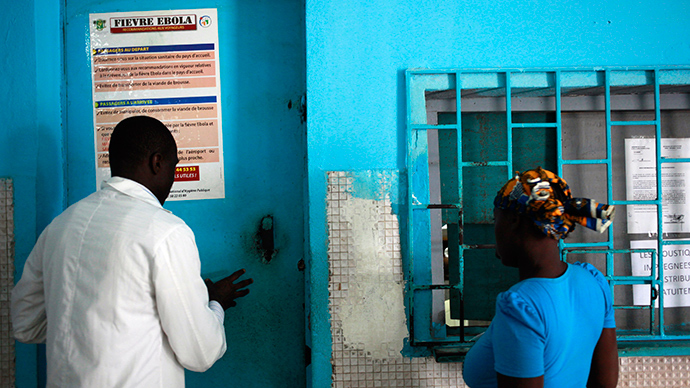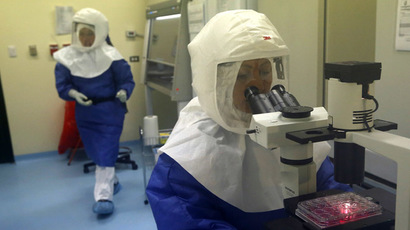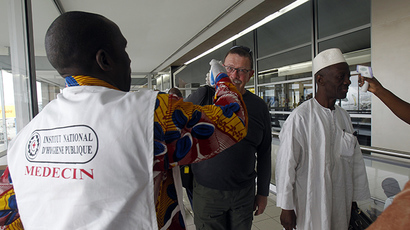Ebola spreading faster, out of control for next 6 months – Doctors without Borders

The spread of Ebola is outrunning efforts to stop it, according to international aid group Doctors Without Borders, which estimates it might take six months to get the situation under control.
The chief of the French-founded group, also known as Médecins
Sans Frontières (MSF), Joanne Liu, spent 10 days in the
disease-hit regions of West Africa, before voicing her
conclusions at a Friday press conference in Geneva.
"[Ebola] is deteriorating faster, and moving faster, than we
can respond to," she told reporters.
The deadliest ever outbreak of Ebola has already claimed 1,145
lives, according to official figures, which could in fact
“vastlyunderestimate” the real magnitude of the
disaster, the World Health Organization warned a day earlier.
#Ebola: international response to #Ebolaoutbreak dangerously inadequate http://t.co/4Qqd9FaccZ
— MSF UK (@MSF_uk) August 15, 2014
"It is like wartime," Liu said. "It's moving, and
advancing, but we have no clue how it's going. Like in wartime,
we have a total collapse of infrastructure."
She gave as an example a 40-bed treatment center in Liberia,
where 137 people are being cared for. Overcrowded facilities
there are “absolutely dangerous," Liu said.
"With the massive influx of patients that we had over the
last few days, we're not able to keep zones of patients anymore.
Everybody is mixed," she said.
Overcrowded hospitals do not mean all of those suspected of being
infected go there. Superstitions and fears make many in African
villages hide their sick relatives at home.
The new Secretary General of the International Federation of Red
Cross and Red Crescent Societies (IFRC), Elhadj As Sy, who has
also traveled to the Ebola-struck region, said in a Friday
statement that “tackling fears, ignorance and stigma”
surrounding the disease in the local African communities was a
major challenge for IFRC volunteers.
As Sy said it was also “particularly important to stop more
healthcare workers in the affected areas from getting infected.”
Most infections from #Ebola are linked to traditional funeral practices or the unprotected care of an infected person showing symptoms
— WHO (@WHO) August 15, 2014
Sierra Leone's president, Ernest Bai Koroma, told journalists
Friday that the country has lost two doctors and 32 nurses to
Ebola.
"We need specialized clinicians and expertise, and that is
why we are appealing to the international community for an
enhanced response to our fight" against Ebola, he said, AFP
reported.
Overall in the four affected countries, 80 healthcare workers
died of Ebola. While 170 were infected, according to Doctors
Without Borders.
#Ebola-affected countries cannot afford losing any nurses & doctors. It is crucial to stop more health care workers from getting infected.
— Elhadj As Sy (@As_SyIFRC) August 15, 2014
Liberia's president, Ellen Johnson Sirleaf, expressed regret
Saturday over the high death toll among the country's healthcare
workers who have fought the Ebola outbreak, Reuters reported.
Meanwhile in Nigeria, where three people have died of Ebola,
while 169 are being checked for possible infection, the president
has decided to sack 16,000 doctors who participated in a strike
for better working conditions, Nigeria’s Premium Times reports.
News of the country’s medical staff being sacked amid fears of
epidemic spreading has resulted in a massive online outcry with
some of the users blaming the government for untimely sacking of
doctors while others blaming doctors for an untimely strike.
Oh cool! So the president fired all the resident doctors in Nigeria during a disease outbreak? Well... #RIP to all of us in advance.
— Ismail (@balogun_castro) August 15, 2014
Authorities of the worst-hit country, Liberia, fear that hunger
could become a by-product of the epidemic, as there are not
enough food supplies in the quarantined areas.
Liberia has requested emergency food aid from donors.
"We can establish as many checkpoints as we want, but if we
cannot get the food and the medical supplies into affected
communities, they will leave," Information Minister Lewis
Brown said, Reuters reported. "We can't ask our people to
starve."
Brown has also criticized the international community for its
slow response to the Ebola crisis.
"The reaction quite frankly is not where we would want it to
be to give any serious level of comfort," he said.














